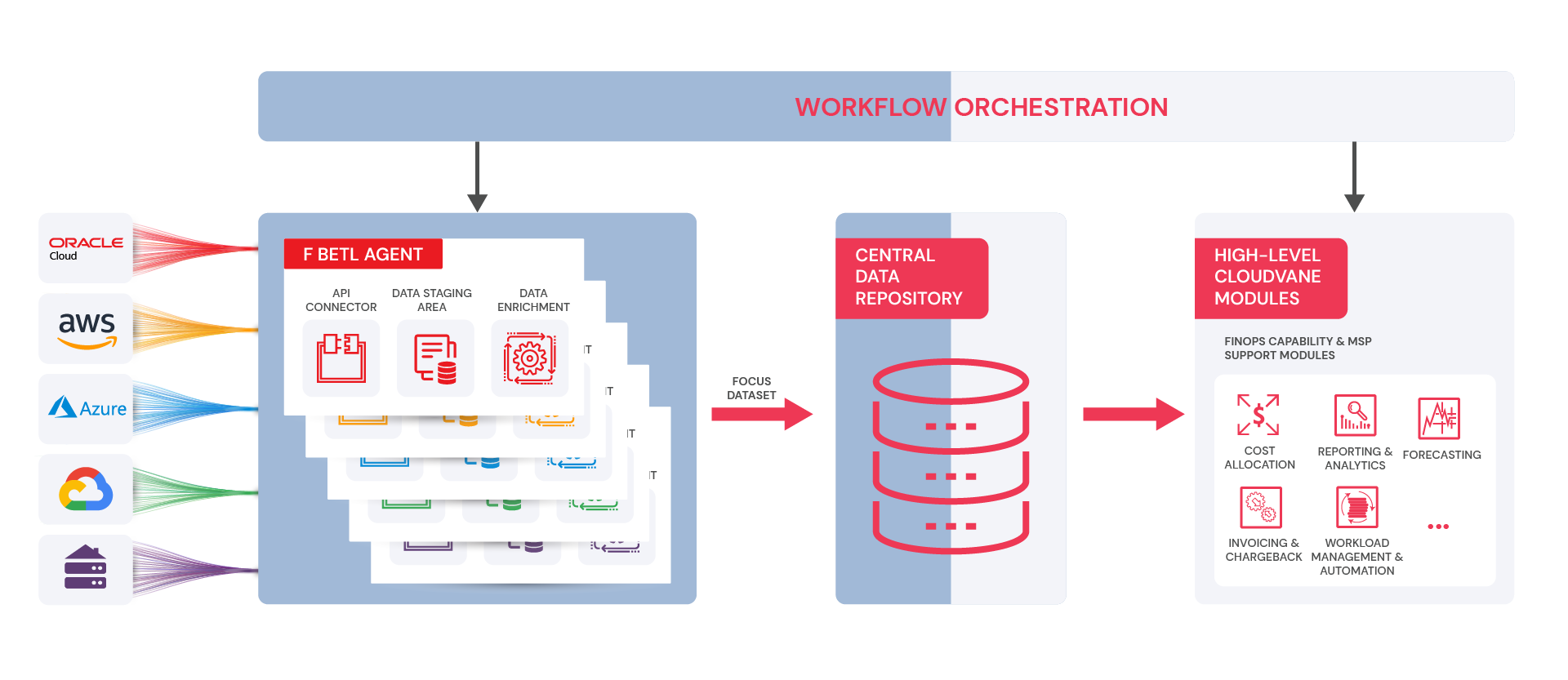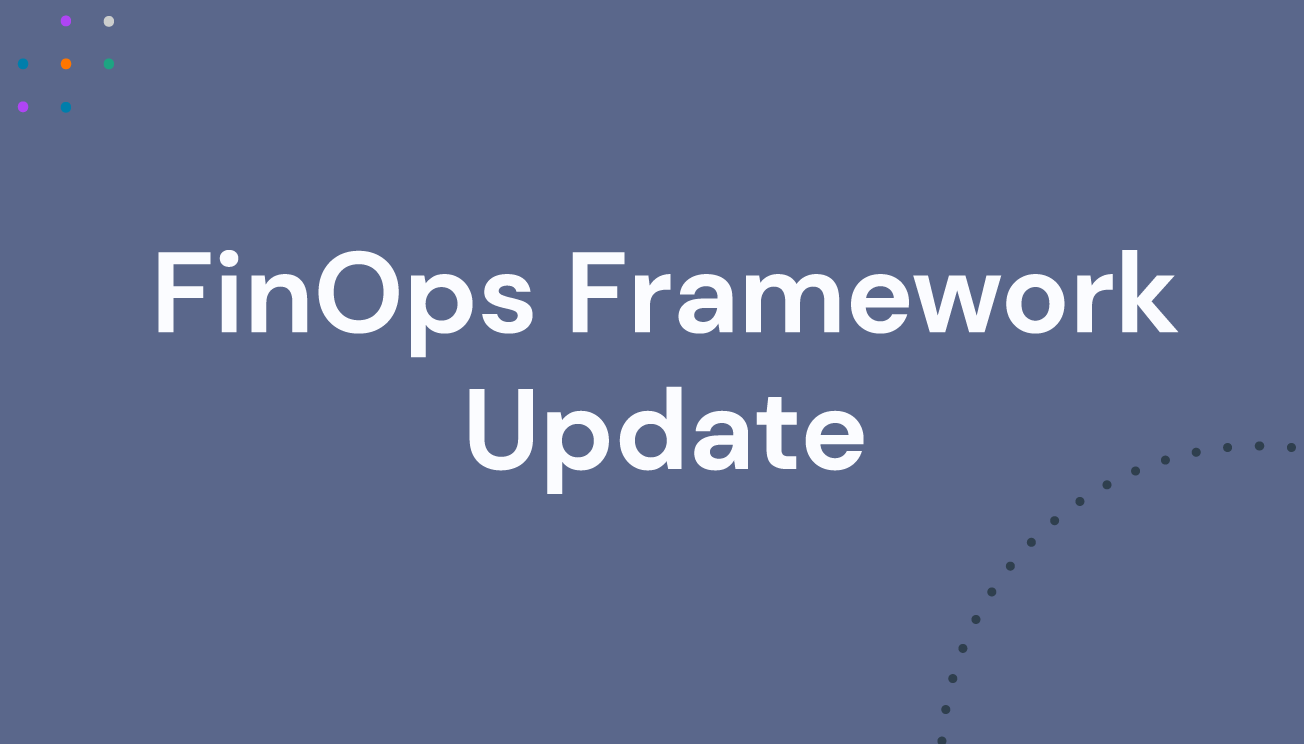FOCUSed CloudVane: The Future of Cost Management
Tajana Belina
31 October 2024

As cloud computing continues to transform businesses by offering ever-easier scalability, flexibility, and enhanced capabilities, the complexity of managing cloud-related costs only increases over time. In a multi-cloud environment, this challenge intensifies since each provider supplies billing data in distinct yet similar formats, containing diverse yet comparable cost and usage dimensions and metrics, while accommodating various pricing and billing models that include provider-specific nuances.
In response to this complexity, CloudVane, a multi-cloud cost management tool, was designed to leverage normalized billing datasets managed by its proprietary Billing ETL (BETL) module. This module ensures that billing data from various service providers is transformed and enriched into standardized datasets, enabling streamlined analysis and reporting, regardless of provider.
And this is where FOCUS – FinOps Open Cost and Usage Standard – comes into play!
The Role of FOCUS
According to the FOCUS website, FOCUS is an open-source project supported by the FinOps Foundation. It serves as a technical specification that normalizes cost and usage billing data across cloud providers.
The FOCUS Specification defines a set of standardized, vendor-neutral cross-cloud cost and usage dimensions and metrics, ready-made for FinOps capabilities, which truly makes a difference.
Recognizing the value of this approach, CloudVane has developed a new version of the BETL, now called the FOCUSed Billing ETL Module (FOCUSed BETL, or F-BETL).
F-BETL utilizes FOCUS-specified terminology, taxonomy, and metrics. It ingests FOCUS-formatted datasets directly from the Cloud Service Provider (CSP) when available, adding custom enrichments as needed. If FOCUS-formatted datasets are not available, F-BETL will ingest and convert proprietary billing datasets to align with the FOCUS format. Subsequent processes performed by other CloudVane modules further enrich the data, enabling F-BETL to deliver enhanced FOCUS-formatted datasets that include additional CloudVane proprietary columns, in accordance with the specification.
FOCUSed BETL Logical Architecture
The F-BETL module employs a modular architecture to accommodate multiple providers, featuring dedicated F-BETL Agents tailored to each provider’s billing data formats and specific requirements. Its logical architecture includes the following key logical components:
- F-BETL Agents: Each agent consists of provider-specific instances of API Connectors, a Data Staging Area, and a Data Enrichment Component. These agents manage raw data storage, handle retrieval processes, and perform billing data transformation and enrichment as needed for each cloud service provider.
- API Connectors (within each F-BETL Agent): Integrate with specific provider API endpoints to fetch billing datasets (either FOCUS-formatted or proprietary) and other relevant data.
- Data Staging Area (DSA) (within each F-BETL Agent): Serves as a dedicated storage area for raw, collected cost data specific to each provider prior to transformation and enrichment.
- Data Enrichment Component (within each F-BETL Agent): Converts proprietary billing datasets to the FOCUS format when needed and applies custom enrichments relevant to each provider.
- Workflow Orchestrator: A single, centralized component managing independent workflows for each provider (i.e., provider account), coordinating the sequence of operations (collection, conversion, enrichment, and ingestion) in parallel across multiple provider accounts. It includes built-in error handling and retry mechanisms.
- Central Data Repository: A unified storage layer that houses enriched, FOCUS-formatted datasets from all F-BETL Agents. This repository is optimized for use by other CloudVane modules, delivering FinOps capabilities throughout the organization.

The F-BETL Logical Architecture (Integral Component of CloudVane Platform).
FOCUS Support Across the Big Four
With all four major cloud providers – Microsoft Azure, Amazon Web Services (AWS), Google Cloud Platform (GCP), and Oracle Cloud Infrastructure (OCI) – now natively supporting the FOCUS 1.0 release for billing dataset exports, FinOps capabilities are more accessible than ever across multi-cloud environments.
If you haven’t yet obtained FOCUS data from your cloud vendor, the FOCUS website provides a comprehensive guide to help you Get Started. Begin by familiarizing yourself with the FOCUS Column Library and supported FinOps Use Cases. Next, proceed to the instructions for accessing FOCUS data from each provider, along with links to their documentation. Each provider offers detailed guidelines to help you navigate their platforms effectively, allowing you to access your FOCUS data and leverage the FinOps capabilities available directly within their consoles.
When exploring native FOCUS-formatted datasets, you might notice that some dimensions and metrics you rely on aren’t included as standardized FOCUS columns in the FOCUS Specification v1.0. Instead, these may appear as proprietary or native columns within the FOCUS dataset. Furthermore, even with standard FOCUS columns, you may encounter some conformance gaps. For instance, AWS notes that their data is still in preview mode and provides an overview of these gaps, while the other three providers supply information on how proprietary columns map to FOCUS columns, helping you identify any gaps.
These obstacles can be addressed through custom transformations and data enrichment on top of the FOCUS dataset. This does require a deeper understanding of both the FOCUS Specification and the specific provider’s proprietary billing schemas. However, if your FinOps practice depends on proprietary columns, it’s likely that your organization already has knowledge of these billing schemas, and becoming familiar with the FOCUS Specification should be manageable.
Conclusion
Transitioning to FOCUS was a logical step for CloudVane, and we’re committed to supporting users in this transition to a standardized, streamlined FinOps approach. As CloudVane is often part of a larger ecosystem, we remain dedicated to supporting our proprietary billing datasets to ease our customers’ transition.
If you’re uncertain about adopting FOCUS in your FinOps practice, we recommend reviewing Adopting FOCUS: The FinOps Open Cost and Usage Specification from the FinOps Foundation to guide you through this exciting shift toward FinOps standardization.


